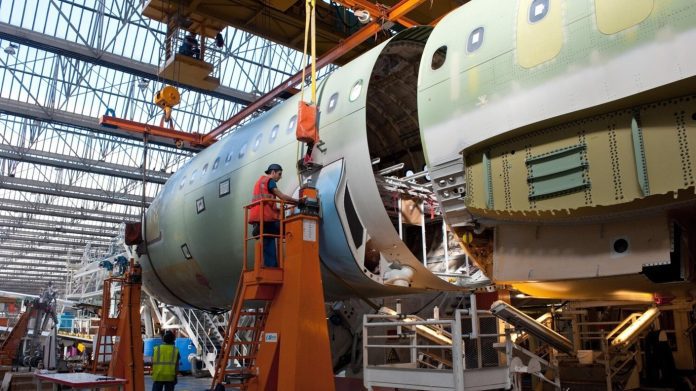European aerospace manufacturer Airbus has announced the deployment of a private LTE network from Swedish telecoms vendor Ericsson at its factory in Toulouse, in France. Ericsson said the deal was an ‘extension’ of an existing partnership between the two firms. The network, described as “close to live”, incorporates NB-IoT for tracking and positioning throughout the facility.
The new LTE setup will be used to connect aircraft production and validation at the factory in Toulouse. The network, covering radio and core LTE elements, can be upgraded to 5G, as required, said Ericsson. The core network is “robust and redundant”, said Ericsson. The network will use mid-band 700 MHz and 2600MHz TDD frequencies; millimeter-wave 5G will be tested throughout 2021.
The Airbus facility in the city of Toulouse features aeronautical engineering and final-assembly line production. “A key feature of private networks is the ability to securely transfer data between different engineering teams located on the site, as well as the connection of devices within Airbus plants and sites through a NB-IoT connectivity solution,” said Ericsson.
Åsa Tamsons, head of business area technologies and new business at Ericsson, said: “Ericsson’s 5G-ready private networks accelerate aerospace innovation and enable the secure transfer of data between different onsite engineering teams and connected devices within Airbus plants and sites.”
The airline sector has been outspoken about the integration of IT technologies into OT environments. Airbus made a memorable appearance a couple of years back at an HPE event, where it laid out a bunch of rules for Industry 4.0. “Take your bullshit tech, and come back when it’s ready,” was its message at the time.
The presentation was captured in a series of articles by Enterprise IoT Insights. “Put IT and OT in the same room, have them talk about ‘real time,” it said, hinting, again, at the distance between the two sides, and the hyped marketing that has been spread for some years around the concept of a ‘fourth industrial revolution’. But it acknowledged, very clearly at the same time, the need to bring compute functions into the very edge of its industrial operations. “Yes, the driller has to drill, but it also has to compute,” it said.
In September last year, Air France reflected on the deployment of private LTE networks at three Paris airports, in conjunction with Groupe ADP (Aéroports de Paris) and its Hub One digital tech unit. It said traditional network operators, as well as network vendors, do not have the in-house expertise to serve the enterprise market with industrial-grade private LTE and 5G networking.
They need hand-holding by market specialists, in the form of enterprise customers and system integrators, if they are to be any more than a conduit for networking gear. This was, in effect, the message from Air France. But the firm has also found a close partner in Ericsson, it said, which was appointed to spec the airport pilots in 2017, and has remained in place ever since. The pair learned together, it implied
“The main [challenge was to have] the best expertise regarding the radio, aligned with the business needs – and not just with broadband expertise, like with an operator. Because an airport is small – it is not a town or a country – [with different] needs for the airport, and the airline. That’s where we had to explain what to do, which was part of the proof-of-concept,” it said — a comment that should probably be taken, now, as a historical reflection.
But ‘vertical’ knowhow, commonly perceived to be offered by system integrators, remains at a premium. In December, aerospace and defence company Saab deployed a factory-wide private 5G network at a manufacturing plant in Sweden. The facility in Linköping, in the south of the country, produces ‘aerostructures’, notably for Airbus and Boeing. The deployment was organised by Swedish tech consultancy Combitech using 5G equipment from Nokia.
Combitech, based in Östersund, handled spectrum frequencies and project management, it said, including the relationship with Nokia. Local system integrator Vinnergi was engaged to handle the network engineering itself. The project is starting with LTE in the upper part of the 1.8 GHz band, which works for indoor coverage; it will migrate to 5G in the second quarter of 2021, according to Combitech, as the Swedish Post and Telecom Authority (PTS) releases spectrum for industrial usage, expected to be at 3.72-3.8 GHz (band N78).

